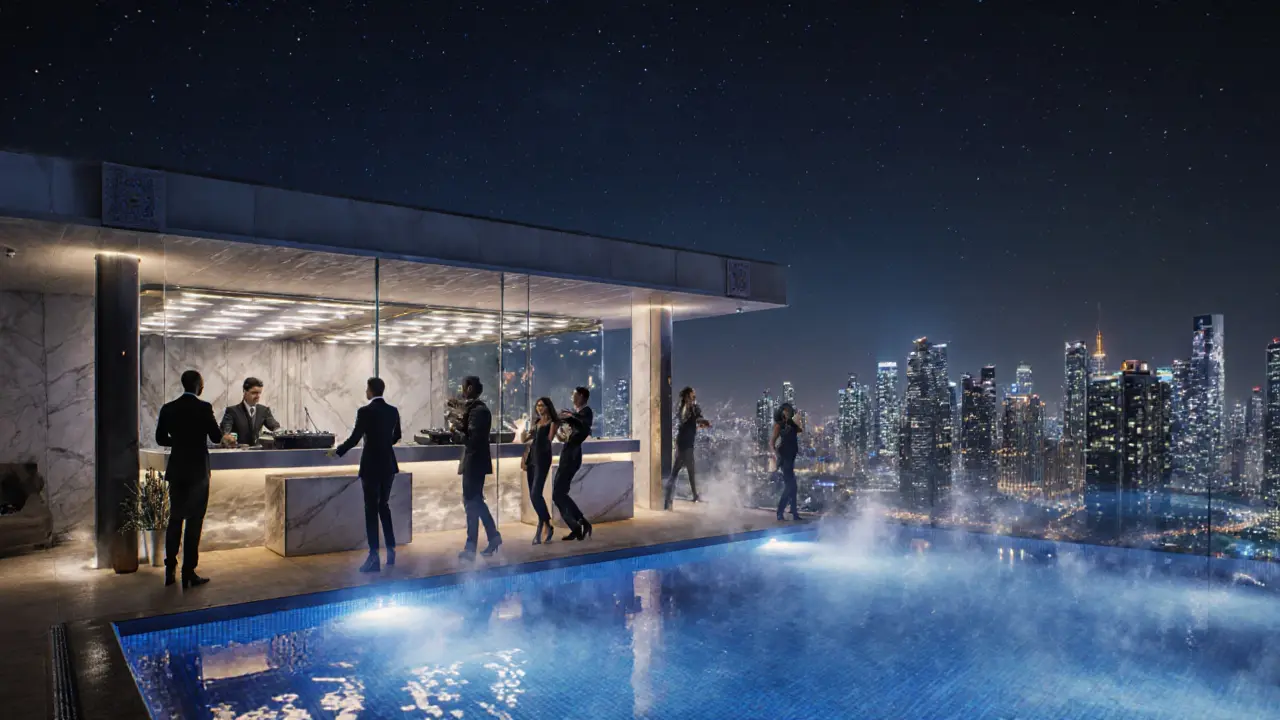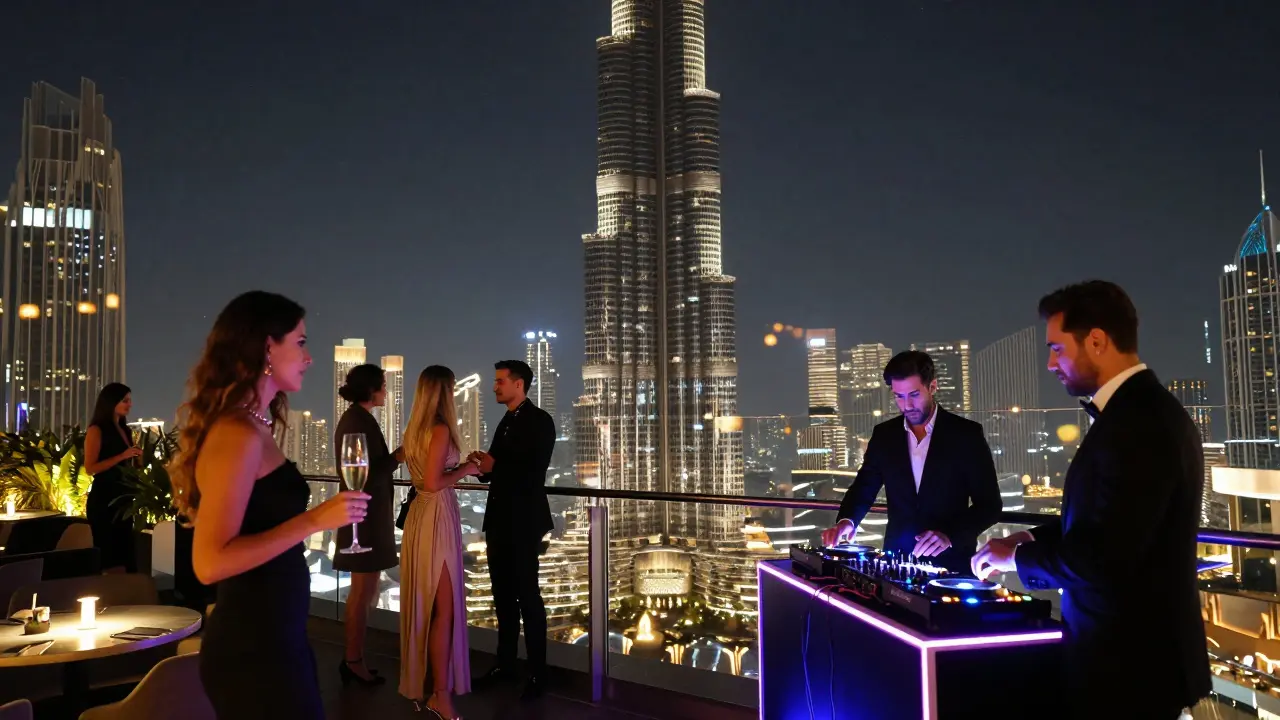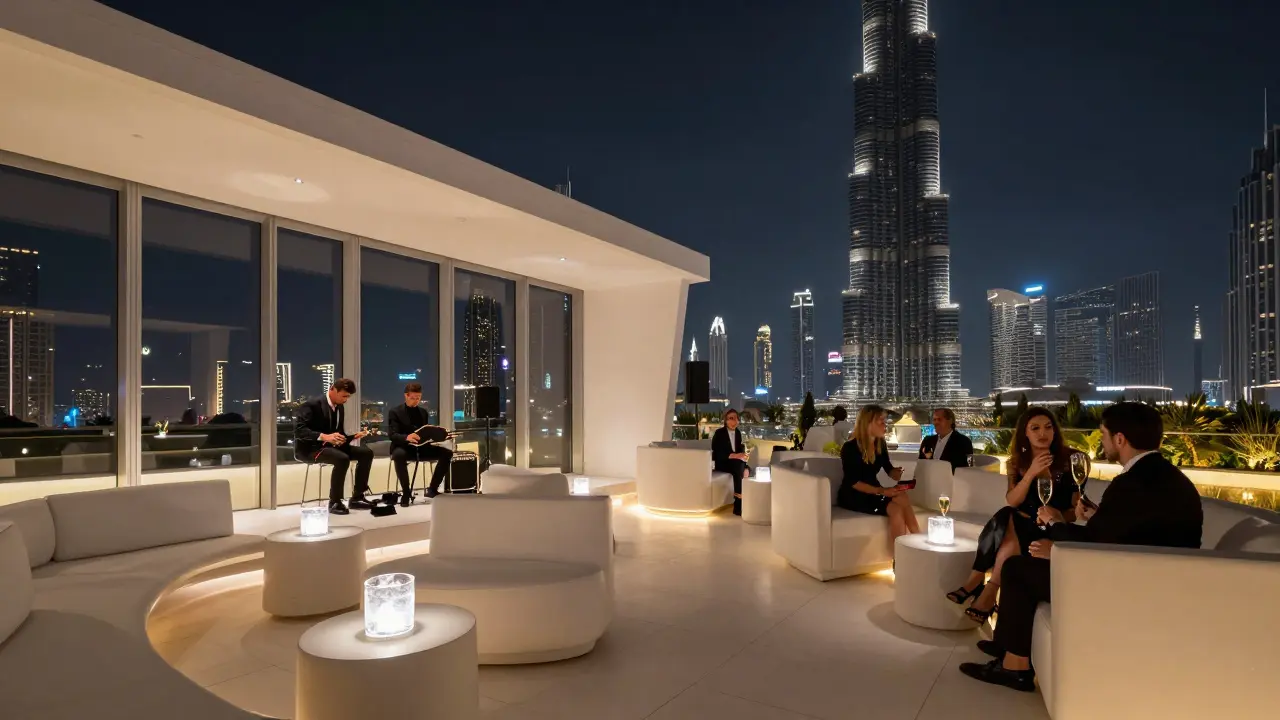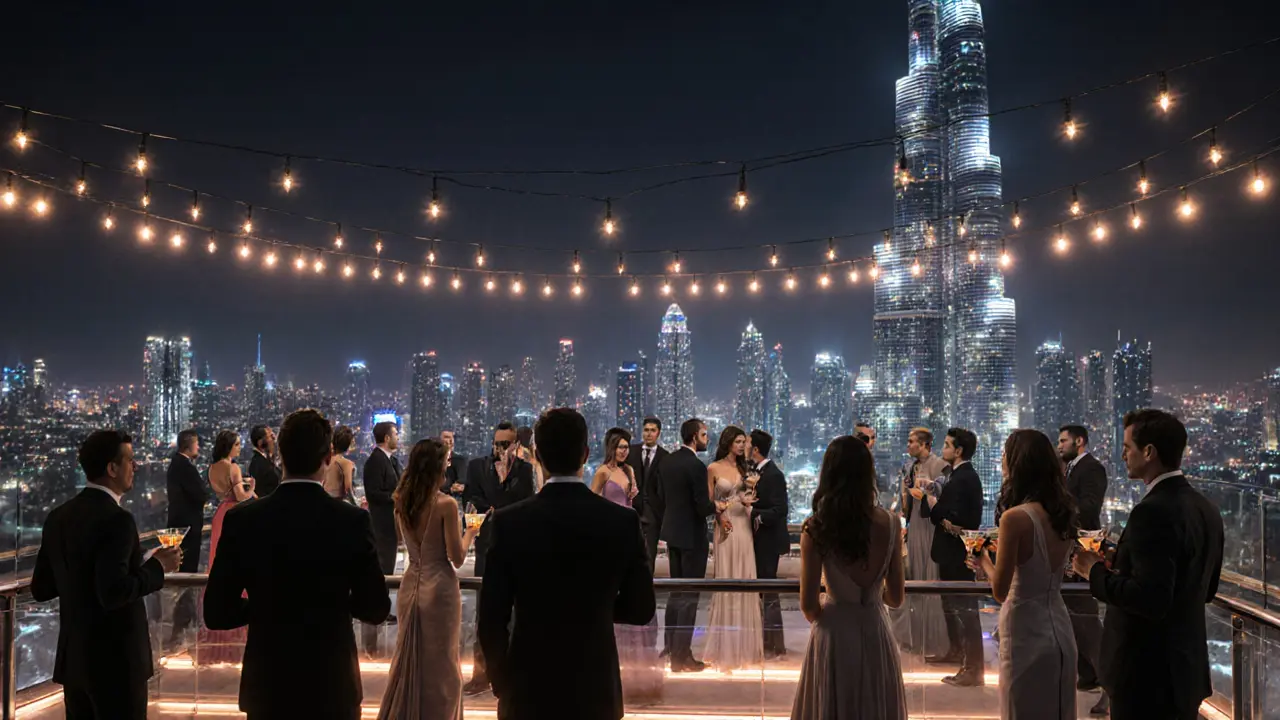Dubai doesn’t just sparkle during the day-it comes alive after sunset. While the city’s skyline steals the spotlight, its nightlife is where the real energy lives. Forget quiet bars and slow jazz nights. If you’re looking for thumping bass, flashing lights, and world-class DJs spinning until sunrise, Dubai delivers. This isn’t just partying-it’s an experience built on scale, spectacle, and serious sound systems.
What Makes Dubai’s Nightlife Different
Dubai’s clubs don’t just play music-they create environments. Think rooftop pools with DJs floating above the city, underground warehouses with industrial lighting, or beachfront lounges where the sound of waves mixes with 128 BPM beats. The city’s strict regulations mean everything is licensed, safe, and polished. No sketchy alleyways or unregulated spots. You get luxury with a pulse.
Unlike other global nightlife hubs, Dubai’s scene runs on a tight schedule. Most clubs don’t open until 10 PM and close by 2 AM on weekdays, with weekend hours stretching to 4 AM. That’s because of local laws, not lack of energy. The crowd? Mostly international-expats, tourists, and regional visitors. Locals are less common, but you’ll still find a strong presence of Gulf-based music lovers who know their basslines.
Top 5 Spots for Live DJ Sets and Electronic Music
Not all clubs in Dubai are made equal. Some are tourist traps with overpriced drinks and mediocre sound. Others are globally recognized venues where top-tier DJs drop surprise sets. Here are the five that consistently deliver:
1. White Dubai
Perched on the 52nd floor of the Address Beach Resort, White Dubai isn’t just a club-it’s a destination. The outdoor terrace offers panoramic views of the Dubai Marina, with the skyline glowing behind the dance floor. DJs here are booked months in advance: names like Martin Garrix, Carl Cox, and Amelie Lens have all played here. The sound system is custom-built by Funktion-One, one of the few in the world that can handle 200+ watt bass without distortion. Entry is strict-no flip-flops, no shorts. Dress sharp or get turned away.
2. Cielo Dubai
Located in the Address Downtown, Cielo is where tech-house and deep techno thrive. It’s smaller than White, but more intimate. The lighting is moody, the crowd is serious about music, and the DJs? They’re not here to play Top 40 remixes. You’ll hear underground artists from Berlin, Detroit, and London spinning vinyl or using Serato. The bar doesn’t even have a menu-just a single drink list focused on premium spirits and craft cocktails. It’s the kind of place where you lose track of time because the music doesn’t let you look at your phone.
3. The Beach House
If you want beach vibes with a club edge, this is your spot. Located at Jumeirah Beach Residence, The Beach House opens at sunset and turns into a full-on dance party by 11 PM. The DJ booth sits right above the sand, so the bass rumbles through your feet as you dance barefoot. Weekends feature resident DJs like DJ Khaled’s longtime collaborator DJ Khaled (yes, he’s played here), and guest spins from regional talents like DJ Hani and R3HAB. The crowd is mixed-some in swimwear, others in designer outfits. Bring a light jacket; the sea breeze hits hard after midnight.
4. Level 43
Inside the Armani Hotel Dubai, Level 43 is sleek, minimalist, and loud. The vibe is modern luxury meets underground club. The sound system is engineered by Meyer Sound, the same brand used in major festivals like Tomorrowland. Expect house, progressive, and electro-pop. The DJs rotate weekly, but you’ll often see names like Nina Kraviz, Solomun, or Tale Of Us. Entry is cash-only on weekends, and the cover charge starts at AED 300 (around $80). It’s expensive, but the production value justifies it-light shows sync perfectly with every kick drum.
5. The Waiting Room
Tucked away in a quiet corner of Al Quoz, The Waiting Room is Dubai’s best-kept secret. No neon signs. No bouncers in suits. Just a plain door and a list. Inside, it’s raw: exposed brick, concrete floors, and a sound system that makes your chest vibrate. This is where experimental techno and industrial beats rule. DJs here aren’t famous-you’ll find local producers from the UAE and Saudi Arabia pushing boundaries. The crowd is small, loyal, and deeply into the music. Open only on Fridays and Saturdays, it’s the only place in Dubai where you can hear music that hasn’t been streamed on Spotify yet.
When to Go and What to Expect
Dubai’s nightlife isn’t 24/7. Most clubs open at 10 PM, but the real energy doesn’t kick in until midnight. Friday and Saturday nights are the busiest-expect lines that stretch around the block. If you want to skip the wait, book a table in advance. Many clubs offer bottle service packages starting at AED 1,500 ($400), which includes VIP entry, a private booth, and a dedicated server.
Women often get in free or at a reduced rate. Men pay more, especially on weekends. Dress codes are enforced, but they’re not arbitrary. No sportswear, no sandals, no hats. If you’re wearing a hoodie or ripped jeans, you’ll be turned away. Stick to smart casual: dark jeans, button-down shirts, heels or clean sneakers.
Alcohol is served, but only in licensed venues. You won’t find it in the streets or unlicensed bars. ID checks are strict-bring your passport. Even if you look 30, they’ll ask for proof. Don’t try to fake it.
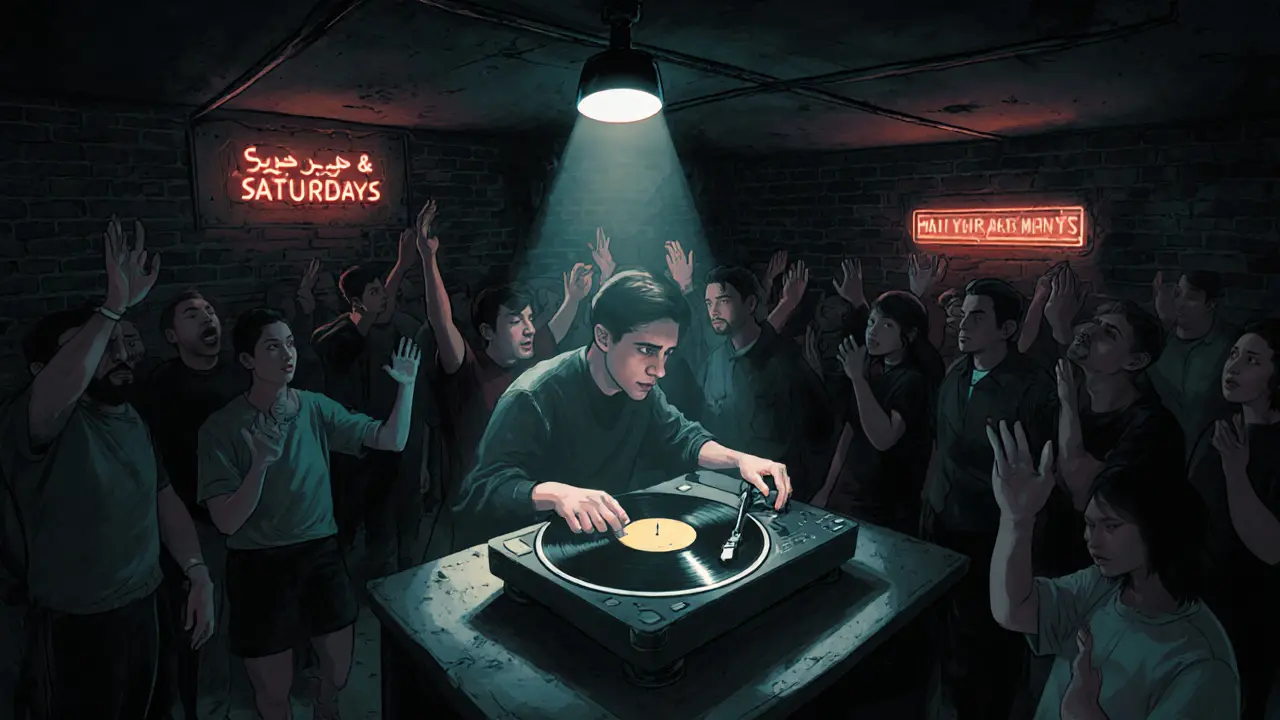
How to Find the Best DJ Sets
Not every club posts its lineup online. Some only announce surprise guests 24 hours before the event. Here’s how to stay ahead:
- Follow Dubai nightlife Instagram accounts like @dubaivibes, @dubaiclubguide, and @the.dubai.nightlife. They post last-minute drops and guest announcements.
- Download the app Clubhopper-it tracks real-time crowd density, DJ names, and entry fees across 20+ venues.
- Check resident DJ schedules. Clubs like Cielo and Level 43 have weekly residents who often bring in special guests. If you know who’s playing on a given Friday, you can plan ahead.
- Ask at your hotel concierge. Many luxury hotels have partnerships with clubs and can get you on guest lists.
What Not to Do
Dubai’s nightlife is safe-but only if you follow the rules. Here’s what gets you kicked out-or worse:
- Don’t take photos of the DJ booth. Many DJs here have strict no-photography policies to protect their sets.
- Don’t bring outside drinks. Security checks bags at the door. Alcohol or drugs brought in = immediate ejection and possible police involvement.
- Don’t be loud or aggressive. Dubai has zero tolerance for rowdy behavior, even in clubs.
- Don’t assume everyone speaks English. While most staff do, some DJs and security staff are from South Asia or Eastern Europe. Keep it simple.
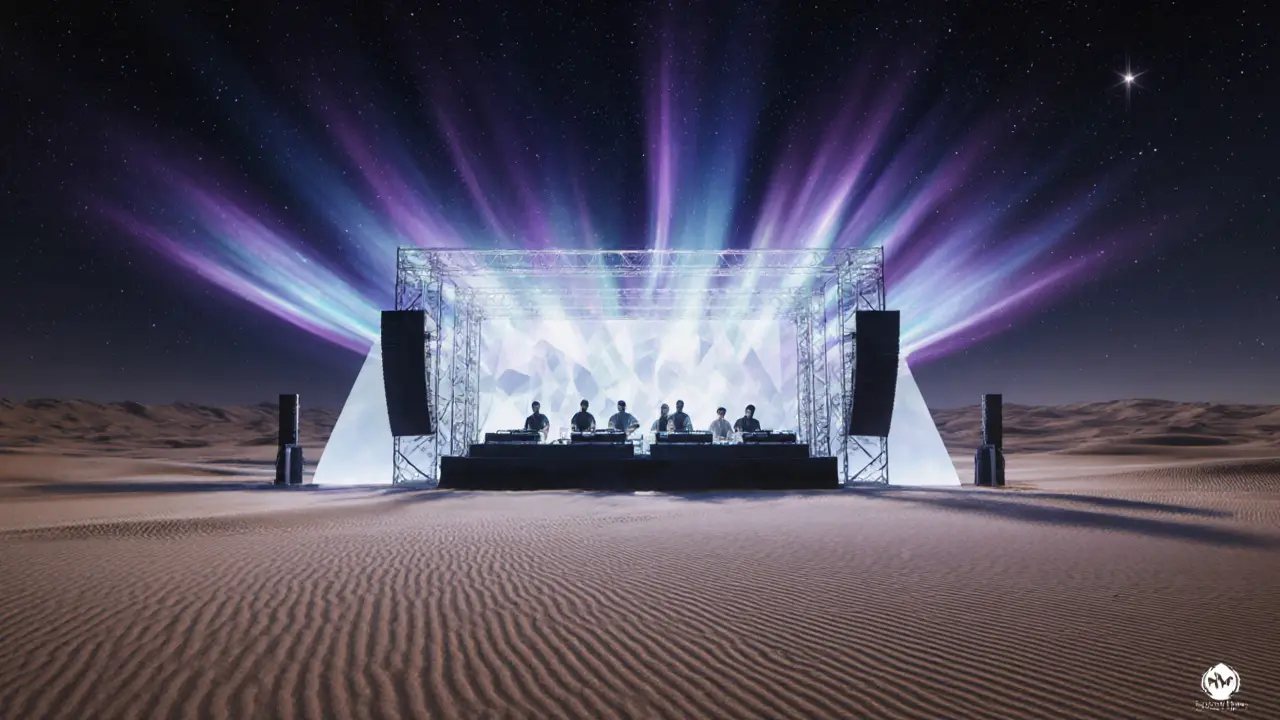
What’s New in 2025
This year, Dubai added two major upgrades to its nightlife scene. First, the Dubai Culture Authority launched a new licensing program for underground clubs, allowing more venues to operate legally past 2 AM on weekends. That means longer nights and more experimental sets.
Second, the city’s first dedicated electronic music festival, Soundwave Dubai, is now a monthly event held at the Dubai Desert Conservation Reserve. It’s not a festival in the traditional sense-it’s a 6-hour immersive experience with 12 DJs, light installations, and zero crowds. Tickets sell out in minutes.
Also, new venues are opening in Alserkal Avenue, Dubai’s arts district. These aren’t clubs-they’re sound labs. Artists use spatial audio tech to create 360-degree soundscapes. If you’re into avant-garde electronic music, this is where the future is being built.
Final Thoughts
Dubai’s nightlife isn’t about flashing cash or showing off. It’s about the music. The best spots here don’t care if you’re rich or famous-they care if you feel the beat. Whether you’re dancing under the stars at White Dubai or lost in a basement techno set at The Waiting Room, the experience is real. You don’t need to know every DJ’s name. You just need to show up, dress right, and let the sound take over.
What time do clubs in Dubai usually close?
Most clubs in Dubai close at 2 AM on weekdays and 4 AM on weekends. Some venues, especially in the new underground scene, get special permits to stay open later, but these are rare. Always check the venue’s schedule ahead of time.
Do I need a visa to go clubbing in Dubai?
No, you don’t need a special visa just to go to a club. But you must have a valid entry visa for the UAE-whether it’s a tourist visa, transit visa, or residency permit. All clubs check ID, and if you can’t prove you’re legally in the country, you won’t be allowed in.
Is it safe to go out alone at night in Dubai?
Yes, Dubai is one of the safest cities in the world for nighttime activities. Clubs are well-lit, security is visible but not intrusive, and public transport runs late. Still, avoid walking alone in deserted areas after 2 AM. Stick to main roads and use Uber or Careem-they’re cheap and reliable.
Can I bring my own alcohol to a club in Dubai?
No. All clubs in Dubai are licensed to serve alcohol, and bringing your own is strictly prohibited. Security scans bags at the entrance, and if alcohol is found, you’ll be turned away. Some clubs even have metal detectors.
What’s the average cost for entry to a top club in Dubai?
Entry fees range from AED 50 ($14) for smaller venues to AED 300 ($80) or more for top-tier clubs like Level 43 or White Dubai. Women often get in free or for half price. Bottle service starts at AED 1,500 ($400) and includes VIP access and a private table.
If you’re planning your next night out, skip the generic tourist spots. Head to where the real beats are-where the music matters more than the view. That’s where Dubai’s nightlife truly shines.
